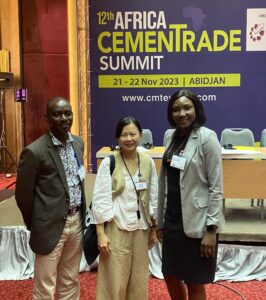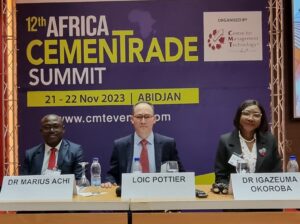Dangote Cement positioned to tackle Africa’s Waste, Climate Change Issues – Pathak
Published by Borderless Media

The 12th Africa Cement Trade Summit has kicked off in Abidjan, Cote d’Ivoire, with the Group Managing Director of Dangote Cement Plc, Mr. Arvind Pathak enlightening industry players on how the cement giant is leading the campaign for save the environment through sustainable production of cement with the utilisation of Alternative Fuels (AF).
Mr. Pathak said cement production is an energy-intensive process which consumes thermal energy of about 3.3GJ/tonne of clinker produced, and its electrical energy consumption is in the region of about 90 – 120kWh /tonne of cement.
He noted that decarbonisation is no longer an option but a necessity, with the use of alternative fuels, such as municipal, agricultural, and industrial wastes, in the place of fossil fuels, which have been effective in emissions reduction.

Mr. Pathak was delivering a paper titled “Utilisation of Alternative Fuels as a Strategy for Sustainable Cement production in Africa” at the Summit organised by the Singapore-based Center for Management. The summit has in attendance cement companies’ Chief Executives, Cement Industry Service Providers and other critical sector stakeholders from across the world.
According to the Dangote Cement Chief Executive, who was represented by the Group’s Head of Sustainability, Dr. Igazeuma Okoroba, Alternative Fuel as opposed to fossil fuels emit less CO2 when combusted and that agricultural biomass are known to be carbon neutral.
He noted that with the level of cement consumption worldwide reaching 4.2 billion tonnes in 2020 and as population is projected to grow by 12‑23% in 2050 due to rapid urbanisation, the demand for cement will also grow, therefore the need to prioritise the inclusion of alternative fuels in fuel mix is crucial to address climate change concerns.
He said the cement industry, which provides a vital material to meet Africa’s infrastructure deficit, generates 7% of the world’s CO2 emissions as the cement value chain involves the intensive use of energy for raw materials’ mining, crushing, mixing, drying, firing, clinker grinding, packaging and dispatch to customers.

This, he posited, places a critical demand on fuel sourcing and controlled energy usage, as almost every stage of the cement value chain produces CO2 emissions, with the bulk of emissions emanating from the firing process during clinker production in the kiln.
“From being the world’s largest bulk cement importers to self-sufficiency and now net exporters of cement to other countries, it is therefore not unexpected that Dangote Cement is one of the pioneer African companies in decreasing CO2 emissions through a fuel substitution strategy. Through reporting, Dangote Cement responds to the evolving environmental, and social challenges by disclosing investment priorities and progress on projects that address the issues.
“We also leverage sustainability reporting to ignite market growth. As part of this commitment, we began reporting in 2020 and received an initial rating of C on climate change. As the company’s actions improved, we rose to a B- and then achieved a B+ rating in 2022,” Pathak added


